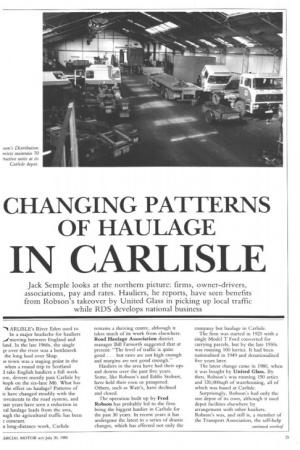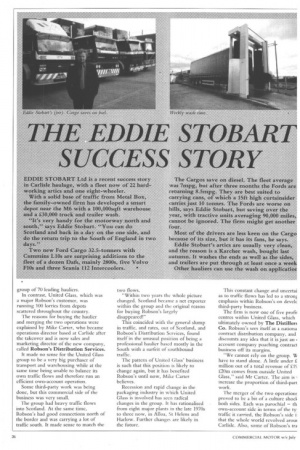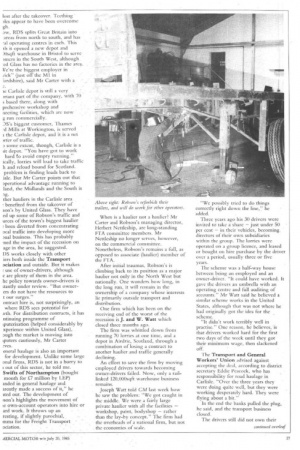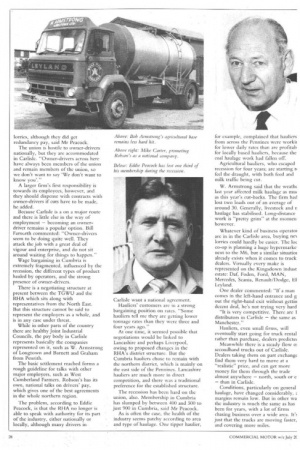CHANGING PATTERNS OF HAULAGE
Page 27

Page 28

Page 29

Page 30

If you've noticed an error in this article please click here to report it so we can fix it.
IN CARLISLE
Jack Semple looks at the northern picture: firms, owner-drivers, associations, pay and rates. Hauliers, he reports, have seen benefits from Robson's takeover by United Glass in picking up local traffic while RDS develops national business
ARLISLE's River Eden used to be a major headache for hauliers —imoving between England and land. In the late 1960s, the single >e over the river was a bottleneck the long haul over Shap.
le town was a staging point in the when a round trip to Scotland 3 take English hauliers a full week. ow, drivers mostly pass Carlisle by lmph on the six-lane M6. What has the effect on haulage? Patterns of ic have changed steadily with the -ovements to the road system, and )ast years have seen a reduction in ral haulage loads from the area, nigh the agricultural traffic has been e constant.
n long-distance work, Carlisle
remains a thriving centre, although it takes much of its work from elsewhere. Road Haulage Association district manager Bill Farnorth suggested that at present: "The level of traffic is quite good. . but rates are not high enough and margins are not good enough."
Hauliers in the area have had their ups and downs over the past five years. Some, like Robson's and Eddie Stobart, have held their own or prospered. Others, such as Watt's, have declined and closed.
The operation built up by Fred Robson has probably led to the firm being the biggest haulier in Carlisle for the past 30 years. In recent years it has undergone the latest in a series of drastic changes, which has affected not only the
company but haulage in Carlisle.
The firm was started in 1925 with a single Model T Ford converted for carrying parcels, but by the late 1950s was running 100 lorries. It had been nationalised in 1949 and denationalised five years later.
The latest change came in 1980, when it was bought by United Glass. By then, Robson's was running 150 artics and 120,000sqft of warehousing, all of which was based at Carlisle.
Surprisingly, Robson's had only the one depot of its own, although it used depot facilities elsewhere by arrangement with other hauliers. Robson's was, and still is, a member of the Transport Association, the self-help group of 70 leading hauliers.
In contrast, United Glass, which was a major Robson's customer, was running 100 lorries from depots scattered throughout the country.
The reasons for buying the haulier and merging the two operations were explained by Mike Carter, who became operations director based at Carlisle after the takeover and is now sales and marketing director of the new company, called Robson's Distribution Services.
It made no sense for the United Glass group to be a very big purchaser of transport and warehousing while at the same time being unable to balance its own traffic flows and therefore run an efficient own-account operation.
Some third-party work was being done, but this commercial side of the business was very small.
The group had heavy traffic flows into Scotland. At the same time, Robson's had good connections north of the border and was carrying a lot of traffic south. It made sense to match the
two flows.
"Within two years the whole picture changed. Scotland became a net exporter within the group and the original reason for buying Robson's largely disappeared!"
This coincided with the general slump in traffic, and rates, out of Scotland, and Robson's Distribution Services, found itself in the unusual position of being a professional haulier based mostly in the South with a surfeit of southbound traffic.
The pattern of United Glass' business is such that this position is likely to change again, but it has benefited Robson's until now, Mike Carter believes.
Recession and rapid change in the packaging industry in which United Glass is involved has seen radical changes in the group. It has rationalised from eight major plants in the late 1970s to three now, in Alloa, St Helens and Harlow. Further changes are likely in the future.
This constant change and uncertai as to traffic flows has led to a stronE emphasis within Robson's on develc third-party business.
The firm is now one of five profit centres within United Glass, which ultimately owned by The Distillers Co. Robson's sees itself as a nationa contract distribution company, and discounts any idea that it is just an I account company poaching contract business off its margins.
"We cannot rely on the group. Nkr have to stand alone. A little under million out of a total revenue of S.20m comes from outside United Glass," said Mr Carter. The aim is I increase the proportion of third-part work.
The merger of the two operations proved to be a bit of a culture shod both sides. Each was parochial — th own-account side in terms of the ty: traffic it carried, the Robson's side i: that the whole world revolved aroui Carlisle. Also, some of Robson's tra lost after the takeover. Teething ales appear to have been overcome gh.
RDS splits Great Britain into areas from north to south, and has . -al operating centres in each. This di it opened a new depot and )0sqft warehouse in Bristol to serve oniers in the South West, although !ed Glass has no factories in the area. Kie're the biggest employer in sick" (just off the Ml in Tordshire), said Mr Carter with a ie Carlisle depot is still a very )rtant part of the company, with 70 s based there, along with • , prchensive workshop and
[leering facilities, which are now . g7 run commercially.
)S's biggest customer, Thames -d Mills at Workington, is served s the Carlisle depot, and it is a net n-ter of traffic.
) some extent, though, Carlisle is a tit depot "You have got to work hard to avoid empty running." ically, lorries will load to take traffic h and reload bound for Scotland. problem is finding loads back to isle. But Mr Carter points out that operational advantage running to land, the.Midlands and the South is lg.
ther hauliers in the Carlisle area benefited from the takeover of son's by United Glass. They have ed up some of Robson's.traffic and urces of the town's biggest haulier been diverted from concentrating Dcal traffic into developing more anal business. This has probably !ned the impact of the recession on age in the area, he suggested. DS works closely with other iers both inside the Transport )ciation and outside. But it makes use of owner-drivers, although e arc plenty of them in the area. he policy towards owner-drivers is ;tantly under review. "But ownerens do not have the resources to
t Our surges."
ontract hire is, not surprisingly, an where RDS sees potential for wth. For distribution contracts, it has ntinuing programme of Lputerisation (helped considerably by xperience within United Glass), Dugh the market is moving into kputers cautiously, Mr Carter .eves.
eneral haulage is also an important for development. Unlike some large anal firms, RDS is not in a hurry to out of this sector, he told me. Swifts Of Northampton (bought month. for kJ million by LEP) inded in general haulage and trendy made a success of it," he Iced out. The development of Ison's highlights the movement of le own-account operators into hire or ard work. It throws up an resting,. if slightly .parochial, mma for the Freight Transport ociation.
When is a haulier not a haulier? Mr Carter and Robson's managing director, Herbert Nettleship, are long-standing FTA cominittee members. Mr Nettleship no longer serves, however, on the commercial committee. Nonetheless, Robson's remains a full, as opposed to associate (haulier) member of the FTA.
After initial traumas, Robson's is climbing back to its position as a major haulier not only in the North West but nationally. One wonders how long, in the long run, it will remain in the ownership of a company whose interests lie primarily outside transport and distribution.
One firm which has been on the receiving end of the worst of the recession is J. and W. Watt which closed three months ago.
The firm was whittled down from running 70 lorries at one time, and a depot in Airdrie, Scotland, through a combination of losing a contract to another haulier.and traffic generally declining.
An effort to save the firm by moving employed drivers towards becoming owner-drivers failed. Now, only a raillinked 120,000sqft warehouse business remains.
Joseph Watt told CM last week how he saw the problem: "We got caught in the middle. We were a fairly large private haulier with all the facilities — workshop, paint, bodyshop — rather than the lay-by concept." The firm had the overhead's of a national firm, but not the economies of scale. "We possibly tried to do things correctly right down the line:: he added.
Three years ago his 30 drivers were invited to take a share — just under 50 per cent — in their vehicles, becoming directors of their own subsidiaries within the group. The lorries were operated on a group licence, and leased or bought on hire purchase by the driver over a period, usually three or five years.
The scheme was a half-way house _between being an employed and an owner-driver. "It could have worked. It gave the drivers an umbrella with an operating centre and full auditing of accounts." Mr Watt said he believed a similar scheme works in the United States, although that was not where he had originally got the idea for the _ scheme.
"It didn't work terribly well in practise." One reason, he believes, is that drivers worked hard for the first two days of the week until they got their minimum wage, then slackened off.
The Transport and General Workers' Union advised against accepting the deal, according to district secretary Eddie Peacock, who has responsibility for road haulage in Carlisle. "Over the three years they were doing quite well, but they were working desperately hard. They were flying about a bit."
In the end the banks pulled the plug, he said, and the transport business closed.
The drivers still did not own their lorries, although they did get redundancy pay, said Mr Peacock.
The union is hostile to owner-drivers nationally, but they are accommodated in Carlisle. "Owner-drivers across here have always been members of the union and remain Members of the union, so we don't want to say 'We don't want to know you'."
A larger firm's first responsibility is towards its employees, however, and they should dispense with contracts with owner-drivers if cuts have to be made, . he added.
Because Carlisle is a on a major route and there is little else in the way of employment — becoming an ownerdriver remains a popular option. Bill Fat-north commented: "Owner-drivers seem to be doing quite well. They attack the job with a great deal of vigour and enterprise, and do not sit around waiting for things to happen."
Wage bargaining in Cumbria is extremely fragmented, influenced by the recession, the different types of product hauled by operators, and the strong presence of owner-drivers.
There is a negotiating structure at present between the TGWU and the RI-IA which sits along with representatives from the North East. But this structure cannot be said to represent the employers as a whole, and is in any case under threat.
While in other parts of thecountry there are healthy Joint Industrial Councils, the pay body in Carlisle represents basically the companies represented on it, such as W. Armstrong of Longtown and Barnett and Graham from Penrith.
The basic settlement reached forms a rough guideline for talks with other major employers, such as West Cumberland Farmers. Robson's has its own, national talks on drivers' pay, which gives one of the best agreements in the whole northern region.
The problem, according to Eddie Peacock, is that the RHA no longer is able to speak with authority for its part of the industry, either nationally or locally, although many drivers in Carlisle want a national agreement.
Hauliers' customers are in a strong bargaining position on rates. "Some hauliers tell me they are getting lower tonnage rates than they were three and four years ago."
At one time, it seemed possible that negotiations would be linked to Lancashire and perhaps Liverpool, owing to proposed changes in the RHA's district structure. But the Cumbria hauliers chose to remain with the northern district, which is mainly on the east side of the Pennines. Lancashire hauliers are much more in direct competition, and there was a traditional preference for the established structure.
The recession has been hard on the union, also Membership in Cumbria has slumpe.d by between 400 and 500 to just 900 in .Cumbria, said Mr Peacock.
As is often the case, the health of the industry seems patchy according to area and type of haulage. One tipper haulier,
for example, complained that hauliers from across the Pennines were workir for lower daily rates than are prat-nab for locally based hauliers, because the coal haulage work had fallen off.
Agricultural hauliers, who escaped recession for four years; are starting u feel the draught, with both feed and milk traffic being. cut.
W. Armstrong said that the weatht last year affected milk haulage as mm as this year's cut-backs. The firm had lost two loads out of an average of around 30. Generally, livestock and n haulage has stabilised. Long-distance work is "pretty grins" at the niomen however.
Whatever kind of business operatoi are in in the Carlisle area, buying neN lorries could hardly be easier_ The lot co-op is planning a huge hypermarke. next to the M6, hut a similar situatioi already exists when it comes to truck dealers. Virtually every make is represented on the Kingsdown indust estate: Daf, Foden, Ford, MAN, Mercedes, Scania, Renault/Dodge, El Leyland.
One dealer commented: "If a man comes in the left-hand entrance and g out the right-hand exit without gettin decent deal, he's not trying very hard "It is very competitive. There are 1 distributors in Carlisle — the same as Manchester."
Hauliers, even small firms, will eventually start going for truck rental rather than purchase, dealers predicte( Meanwhile there is a steady flow oi secondhand trucks out of Carlisle. Dealers taking them on part exchange find them very hard to move at a "realistic" price, and can get more money for them through the trade almost anywhere — north, south or e — than in Carlisle.
Conditions, particularly on general haulage, have changed considerably, margins remain low. But in other wa the industry is much the same as has been for years, with a lot of firms chasing business over a wide area. just that the trucks are moving faster, and covering more miles.




















































































